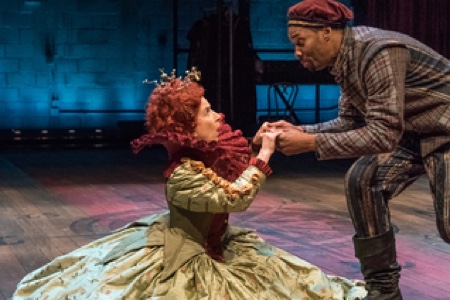How Shakespeare Imagined Julius Caesar's Invasions of Britain

William Shakespeare’s play Cymbeline is the story of a king who had long ago lost his small children, his daughter’s journey across the British Isles dressed as a man and a mirthful band of various cavaliers vying for influence with the monarch. At the same time, though, it is the story of the Roman Empire’s attacks on Britain (Julius Caesar was the first to do so) and the way that the patriotic Brits met their foes.
In the Shakespeare and Company’s production of Cymbeline, which just opened, director Tina Packer not only does a magnificent job of developing the emotional traits of the various characters, but gives audiences a generally good drama about an intriguing time in British and Roman history.
Thanks to her deft work, and simply sensational acting by all in the play at the Lenox, Massachusetts theater in the Berkshires, the jaggedly written Cymbeline flourishes as a story about history and the people who made it so enthralling two thousand years ago. Even though it takes forever to get going, it is a voluptuous production, full of both thumping bravado and sharp humor.
The story in brief: King Cymbeline, married for the second time to a power-mad shrew (everybody hates her), lost his two sons years ago. His daughter Imogen (everybody loves her) secretly married a nice guy, Posthumus, but took off, dressed as a man, with hubby in full pursuit. She winds up in a forest and is taken in by Belarius and his two kids, who turn out to be the king’s long-lost sons. Earlier, Imogen was the subject of a wager that a Roman nobleman, Iachimo, could sleep with her. Those awful Romans! While all of this is going on, the step-mom Queenie’s son, Cloten, a nasty, self-centered, blithering idiot if there ever was one, is hopping about England, getting himself into trouble wherever he goes.
These stories take place within the historical story of the Roman invasions. Here, Shakespeare really plays with history. He has the Brits defeating the Romans on British soil. There never was one battle in which the Brits saved themselves and in fact, they were constantly defeated by the Roman armies for a period of 200 or so years, although they achieved some small victories in that time. The Romans invaded first in 55 BC under Julius Caesar and again the next year, setting up camps and claiming victory. Later, in 43 AD, forces under Roman Emperor Claudius invaded in force and conquered Britain. These forces engaged in dozens of battles throughout the country and constructed Hadrian’s Wall (the Brits are constantly discovering ruins of old Roman forts). Shakespeare’s distorted history at least sets up numerous swordfights, charges and diplomatic wrangling that make the play quite thrilling in an historical sense.
What really makes the play thrilling, though, are the performances of a skilled ensemble cast. My favorite was Jason Asprey as the offensive, bungling Cloten, who plays to the crowd from one side of the stage to the other and is the target of countless jokes. Director Packer also gets fine performances from Thomas Brazzle as Posthumus, Jonathan Epstein as Cymbeline, Nigel Gore as Belarius, Deaon Griffin-Pressley as Pisanio, Tamara Hickey as Imogen, Ella Loudon as Guiderius and Bella Merlin as the evil Queen.
A real problem with the play is that it is overly long. It runs two hours and fifty minutes and you think at times that the Roman invasion of Great Britain probably took less time than the play about it. The fault is not with the director, but Shakespeare himself. It was one of his last plays and I guess he wanted audiences to get their money’s worth. The overblown, wordy Bard could have cut a good twenty minutes or more off the play. The first act, especially, could use some trimming. The story is complicated enough, but in the first act, in order to set up the tale, Shakespeare puts in far too many scenes and lengthy dialogues, especially in the first half hour or so. After that bumpy start, though, the play sails, just sails, through the night, a rich and wonderful historical tale.
The play’s length, and the number of complex characters, may have caused its historical unpopularity. That’s too bad because this is a solid play, even if it needs some editing.
My other complaint, and it is tiny, is that the play is staged on a practically bare stage. Except for Imogen’s bed, there is no set. The director thinks we can all close our eyes and see England two thousand years ago, but we can’t.
The actors more than make up for that, though, in putting on this enthralling production about King Cymbeline’s England and the Roman invasion that rocked it.
PRODUCTION: The play is produced by Shakespeare & Company. Costumes: Tyler Kinney, Sound: David Reiffel, Lighting: Deb Sullivan, Sets: Kris Stone, Fight Director; Jason Asprey, Movement Choreographer: Kristin Wold. The play is directed by Tina Packer. It runs through August 6.